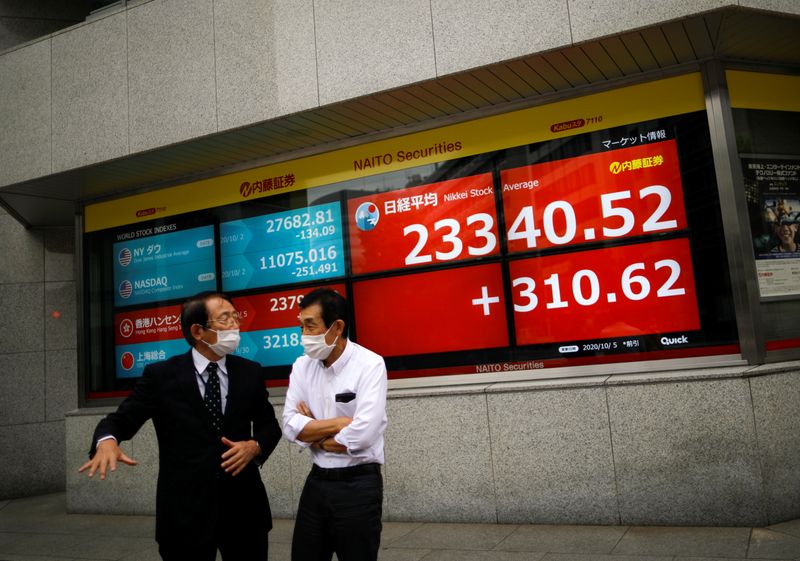By Pete Schroeder and Julie Zhu
WASHINGTON/HONG KONG (Reuters) - Asian stocks came under pressure on Tuesday as investors struggled to balance hopes for more economic stimulus and vaccines with fresh concerns about a surge in COVID-19 infections.
Mixed Asian trade followed a similarly mixed Wall Street session in which the tech-heavy Nasdaq Composite closed at a record high while the two other major U.S. indices fell.
European markets are also likely to struggle for firm direction with London's FTSE down 0.3% and Eurostoxx 50 futures and those of Germany's DAX flat.
"You saw more than a slight moderation to the S&P 500, and the Dow, but you're still looking at these markets at record highs," said Tom Piotrowski, a market analyst with CommSec. "It's a matter of looking out for what the next catalyst is for these markets."
MSCI's broadest index of Asia-Pacific shares outside Japan narrowed its losses from early trade, but was still down 0.02% as anxiety over the coronavirus pandemic capped sentiment.
Among Asia's top markets, Australian shares closed higher for a sixth straight session, lifted by data showing an improvement in business sentiment. The S&P/ASX 200 index rose 0.2% to 6,687.7, adding about 3% in the past six sessions.
However, Japan's Nikkei 225 dipped 0.22% and Seoul's Kospi lost 1.53%.
Chinese blue-chips remained flat while Hong Kong's Hang Seng was down 0.56%, as Sino-U.S. tensions continued to weigh on the market.
Chinese Foreign Minister Wang Yi assured U.S. executives that Beijing remained committed to the Phase 1 trade deal with the United States. That came as a report showed China's purchases of U.S. goods and services as of October, specified in the Phase 1 deal at $75.5 billion for 2020, was about half the level they should be on a pro-rated annual basis.
On Wall Street, the Nasdaq Composite rose 0.45% while the Dow Jones Industrial Average dropped 0.49% and the S&P 500 lost 0.19%.
Some investors are watching whether U.S. policymakers can reinvigorate efforts to pass additional pandemic stimulus. The U.S. Congress is expected to vote this week on a one-week stopgap funding bill to give negotiators more time to strike a compromise, as the business community cautioned inaction could spur a deeper recession.
At the same time, California, the nation's most populous state, announced new restrictions on travel and business activity after record case numbers and hospitalizations. Officials in New York warned similar restrictions could be employed soon, which further weigh on the nation's recovery.
The dollar slid against most currencies as investors eyed potential stimulus and vaccine development. An index that tracks the dollar against a basket of currencies was little changed at 90.829, not far from 90.471, its weakest since April 2018.
Sterling clung to hopes of a meeting between British Prime Minister Boris Johnston and European Commission President Ursula von der Leyen salvaging a Brexit trade deal.
The British currency was on edge but holding on at $1.3360 in the Asia afternoon session, well above Monday's low of $1.3225.
The yield on the benchmark 10-year notes rose slightly to 0.9361% on Tuesday.
Oil prices fell, extending losses from the previous session. Brent crude fell 0.72% and U.S. crude dipped 0.57%. Prices came under pressure after Reuters reported the United States was prepping sanctions on at least a dozen Chinese officials over alleged roles in Beijing's disqualification of elected opposition legislators in Hong Kong.

Spot gold prices were 0.22% higher at $1,867.70 per ounce, and U.S. gold futures settled up 0.31% at $1,871.7, as investors bet on more stimulus money being pumped into the financial system.